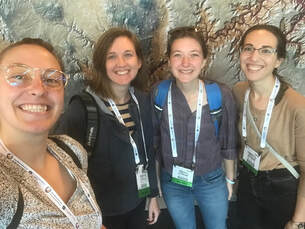 (photo taken by Daphne Kuta) Attending a conference has a lot of advantages for UGs – networking, the opportunity to do informational interviews, the opportunity to meet potential advisors, learning new science, and connecting with peers. I know that, and as a faculty member or senior graduate students, you probably know that too. But a first-time attendee? They don’t know that, and it is your privilege to help them figure that out. I was sent to my first conference without any guidance and it was a disaster – I had no idea what to do and frankly it was a waste of money. As a first-generation college student, I felt like I didn’t know what I was doing and that I didn’t belong. I saw peers who seemed to know everything, and when I got to graduate school, curious about that experience, I asked some folks about their first ever conferences. Turns out if you have a family member in science or academia, your first conference goes a lot better whether you have an attentive advisor or not. Here I ask you and call upon you to make every undergraduate researcher feel like they have someone in their back corner when they attend a conference for the first time. So, what can you do to help? Before attending the conference, look up free networking events and make a schedule. Ask your students what sounds interesting to them and help them add it to their calendar. But, make sure that you aren’t overwhelming their schedule either. It’s important that they have breaks. It’s also a good idea to teach the undergraduates how conference app’s work or how the scheduling works (if you are familiar with the conference). That way they can look up things on their own. Suggest scientific sessions that will be the most useful. You likely have a better idea of what sessions, led by what scientists, will be good for your type of science than the UGs do. It’s OK to suggest a few to the students that you know will be good. Don’t require them to go, but just so they have a starting point of what might be interesting. Help students draft an email for different situations. Maybe a student is hoping to meet up with a potential advisor, or maybe a student is hoping to follow up on a talk that they thought was really interesting. You can help students out by drafting practice emails with students that address those situations. Then they can have these emails in their draft folders, and if they decide to send them off to someone they met or would like to meet while at the conference, then that’s great! Before the conference, make sure the student’s get a lot of practice. Are they presenting or giving a poster? Make sure they can go through it with you a few times. If they are networking, have a “fake” networking event where students can practice introducing themselves and explaining what they do (succinctly). If they want to follow up on a poster presentation or a talk, give your students some sentence structure that is easy to deploy. For example, “Hello ____, I really enjoyed your presentation on _____, do you have 5 minutes to answer a few questions?” Daily check-in’s while at the conference. These check-in’s can be 5 minutes and in passing if you are super busy while there but have a plan to see your students every day while at the conference to make sure that they are 1. not overwhelmed, 2. not being harassed or anything else, 3. accomplishing what they want to be accomplishing, and 4. feeling OK about the experience so far. Remember to have fun!
1 Comment
|
AuthorI am a Ph.D. Candidate who actively tries to create an equitable and enriching experience for undergraduate researchers, I post weekly about the things I teach and my experiences with undergraduates. Archives
August 2021
Categories
All
|
 RSS Feed
RSS Feed
